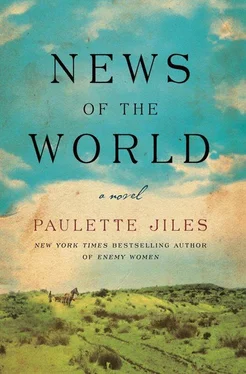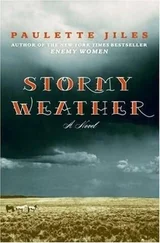They passed only two farm wagons and another company of cavalry in all that way. The cavalrymen were being moved from San Antonio to Fort Sill and the major reminded the Captain to be careful. There were raiders, he said, in the hill country.
Then why don’t you do something about them? the Captain said.
I am under orders, sir. We don’t just go wandering about and do whatever we like. The major pressed his heels to his horse and rode on. Johanna sat quietly in the back and watched after them as they went on north.
They camped near the town of Langford Cove and he felt entirely recovered.
At Lampasas was a great good spring of water. He had passed by there several times. It would be a good place to shake out their blankets and take their ease. They were now in a high, flat country, where trees were scarce and the brush all spiky with thorns and new leaves.
Four years ago he had come up this road to North Texas. It was a year after Maria Luisa died. He had moved out of that graceful Spanish town of San Antonio with its two-story stone buildings and the ornate cast-iron balconies, their cottage roofs shingled with slate. The old Spanish houses all had their backs to the river. The owners of those homes carefully kept record of their descent from the original settlers from the Canary Islands who had come in 1733, the Betancorts, the Reales, they had retreated behind polished wooden window bars. They retreated into the cool of tiled floors. Into the gestures of fans and mantillas and morning mass at San Fernando, increasingly hemmed in by German Catholics and Irish Catholics in the pews, people with incomprehensible languages. Spain, Daughter of Light, Defender of the Faith, Hammer of the Moors, sadly faded.
He recalled excursions on the river, the girls so like their mother with gray eyes and dark curling hair and boats passing by offering melons. The immense cypresses. The one that was a hundred feet tall knee deep in the San Antonio River. Joyous memories.
When he met her he had been setting up his own print shop on Plaza de Armas, slinging ink and type, deeply engaged in the process of making words appear on paper. He could pick up a stick of type and read it backward, he knew from the sound of the paten if it would be a good print or not. He knew his inks and his papers. He delighted in these perfectly printed messages to the world even if he were not carrying them personally.
What good was a beautiful town like that when she was not there? He turned his face to the sky in an effort to clear his head. They went away and never said another word to you again. In some strange way it made him mad. Not a word, not a sign. No messages from the Other World, or perhaps there were signs and he did not see them. He watched two caracara eagles sailing on their black pirate wings, their red hoods and white vests, and heard Johanna singing “Hard Times”: Iss the song and the sigh of the willy . . .
Weary, he corrected her, smiling.
Yes Kep-dun, is willy, sigh of a willy.
They were only a few miles from Lampasas now; around them the creosote bushes were stiff as bones. Their rounded leaves vibrated in the wind. To the north streams of cirrus were like a frosted sandstorm, veils of high-borne mist poured out of the Polar regions. Perhaps more storms to come.
Soon they would come to the hill country. It was scored by deep canyons and high bluffs. Clear streams cut through layers of limestone. There would be more cover there for raiding parties of Kiowa and Comanche but they would deal with that when they came to it. They pressed on. The wheels of the excursion wagon lifted a spume of dust in yellow and pink. For a long time he could see no other wagons but themselves.
But after a while they came upon an elderly lady in a gig. He could see it from a long way off as a jiggling dark roundish thing like a beetle that resolved itself into a vehicle with the quavering legs of a long bony horse pulling it. An accordion top rose over the two wheels.
Well, here is somebody, she said. She pulled up beside them. She was trim and small and wore a new-fashioned pancake hat in straw tipped rakishly to one side. Her white hair was done up in a roll all around the bottom of her head and she wore tight brown driving gloves.
Yes ma’am, and where are you going?
I am going all the way to Durand. I believe I can make it in three days. People have tried to discourage me from this journey but I ignore them. I have a lawsuit to pursue.
I see, said the Captain. From . . . ?
Lampasas.
Then you will do me a favor, please. He reached down for his canvas bag of coins. I would be obliged if you would take these two fifty-cent pieces to the fellow at the stave mill there in Durand. The one that makes the brooms.
That animal, she said. Whatever you are paying him for he doesn’t deserve it. I have half a mind to refuse.
I wish you wouldn’t. We inadvertently came away with two of his hens and I would not be known as a chicken thief. It has been bothering me.
There is no chicken in Texas worth half a dollar in silver, sir.
I consider it an apology, of a sort.
You have a tender conscience.
Chicken thieves are not highly regarded.
True. Give it here, then.
He stepped down and brought the coins over to her. Many thanks, he said. He lifted his sweat-stained old field hat.
And where are you going?
To Castroville, the Captain said. I’m a seed buyer.
Very well. That girl has a peculiar stare. Is she disturbed in her mind in some way?
The Captain got back into the wagon and picked up the reins from the driver’s post. No, he said. I wish you a safe journey.
AT NOON HE put the saddle on Pasha. He would ride alongside the packhorse’s head. This was not friendly country. As he put the saddle on he finally gave in to old age and reached for one of the sheep fleeces out of their stack of blankets and threw it across the saddle seat. So much more comfortable than the hard leather. Johanna watched, her dark blue eyes mild and understanding now that the strange old woman was gone. He snapped a lead on a ring of Fancy’s driving bridle and held the lead in one hand as they went on. Their water bottles were full. It would do. They would be at Lampasas soon. Pasha’s easy smooth walk was a joy to ride and the Captain could not help but pat his neck and fool with his mane and try to get it to lie all on one side.
THERE WAS QUITE a lot of trouble in Lampasas. He knew this from when he had passed through years earlier. It was one of those feuds between two families, each with a large number of sons. It seemed to be one of the rules or laws of human nature. The boys all grow up together and then they become young men and they fight, at first in play, and then somebody gets hurt, and before you know it the revenge drama is on.
Around them the dun-colored pelt of grasses shone in the thin sunlight as if it were studded with mica and quartz and now with the days growing longer the first green shoots grew up beneath. He began to see more people on the road going toward Lampasas. As best he could calculate it was a Saturday and perhaps the people in this region found it their custom to come to town to shop or celebrate or seek out company on a Saturday and stay all night to sleep off a hangover or go to church in the morning or both.
It was now the second week in March and a time of tender growth, when it slowly dawned on people that the world would not always be cold and brown. This high level country was like something unexpectedly and suddenly loved and responding to the bounty of young rain and longer hours of sunlight. Awake, awake, ye drowsy sleeper. The wind was fresh and wet. They drove through the Brooke crossing of the Lampasas River. As in all semi-arid regions the green was all in the riverbeds, the ravines, the stream crossings where water gathered and the wind sailed overhead. Thick colonies of Carrizo cane grew in the little valley of the Lampasas and they shook their glossy plumes in concert.
Читать дальше












